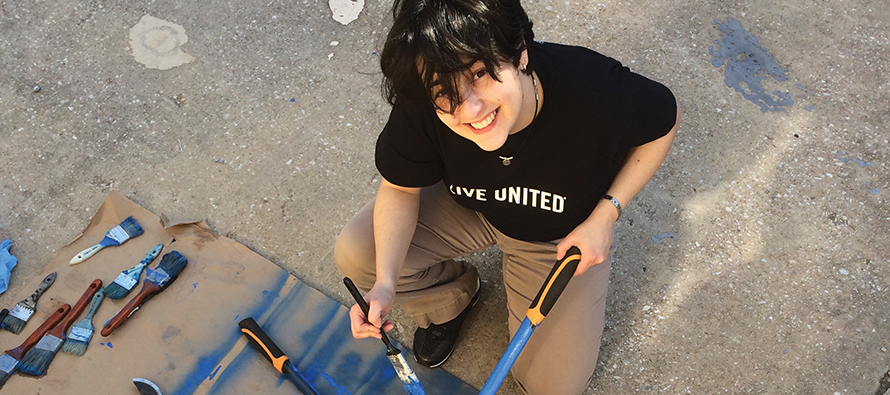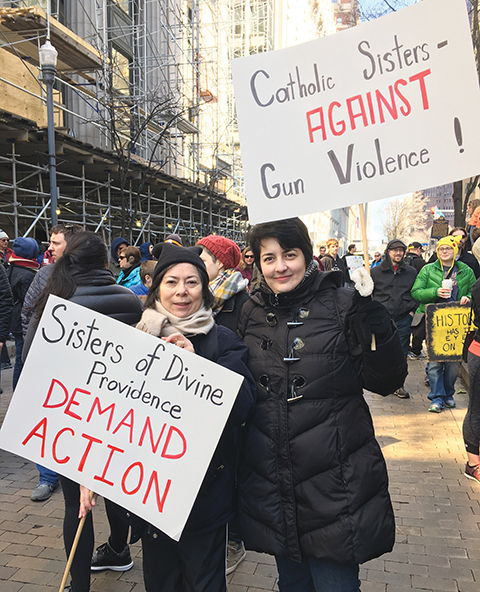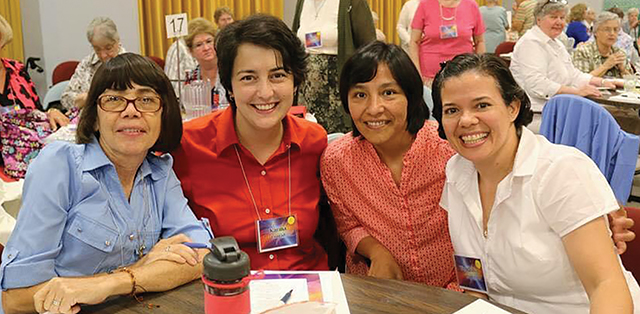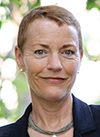Bringing sacred healing to hurting communities

Sister Karina Conrad, C.D.P. volunteering during an alternative spring break event in Baltimore.
THE THING ABOUT God’s call is that it nags you until you respond. Then, it nags you more until you get it right. Sister Karina Conrad, C.D.P. knows plenty about both experiences because it took time for her to get it right.
In the crosshairs
It was July 4, 2022. Conrad was relaxing in the Chicago-area home she shares with another Catholic sister. It had been a long week at the two behavioral health clinics where she served. No fireworks or parades were on her schedule. She planned to enjoy the quiet. At the moment, she was scrolling through Facebook posts on her phone.
Then she saw the breaking news: An active shooter was mowing people down at the nearby Highland Park parade. Videos from parade-goers showed families running, belongings scattered, as they tried to escape the attacker. Carnage and chaos were replacing what had been a happy celebration with floats, American flags, candy, and patriotic music.
“I got an urgent email asking for Spanish-speaking therapists. I prayed, ‘God, what do I do?’ I felt God answer, Go. They need you. I’m with you. I had never helped someone through this kind of trauma before. I’d never thought I would need to. You never think a shooting is going to happen in your backyard.”
Conrad waded into the crosshairs of shock, grief, and a landscape of human lives lost, devastated, and forever changed. Although she’s still processing the experience more than a year later, she’s certain of two things: It affirmed she is on the right path, and it deepened her gratitude that the right path—and place—finally materialized.
It just took much longer than she had anticipated.
First nudges
Conrad’s first inkling that she was being called happened after what she calls her “grumpy face phase,” the attitude she brought to her Miami parish church every Sunday throughout her adolescence. What did Mass have to do with her? That phase lasted until she found herself in a pew at Confirmation, checking the last box off her Catholic-child-must-do list. She was sitting there only because she was supposed to be sitting there.

Then something happened. “I felt something as I was anointed with oil. Peace started running through my body. I really felt it. Then the bishop asked, “Has anyone ever thought about becoming a sister or priest?” Of course, I never had. But suddenly I wanted so much to raise my hand. I looked behind me, but no one was raising theirs, so I didn’t raise mine.”
Conrad’s Costa Rican mother had insisted her daughter complete the Confirmation process (her Cuban father didn’t practice a faith). But her parents had also been affirming of her questioning nature. So Conrad always felt supported, no matter how she challenged convention.
Conrad didn’t know what her Confirmation experiences meant, but she was moved by them. She joined the church youth group and began attending Mass willingly. She explored a more personal relationship with God. She also gave voice to the artist within by enrolling in an “eye-opening” performing arts high school as an accomplished clarinetist. “It shaped me a lot. The arts, the creativity, all kinds of people. It was incredibly diverse—races, sexual orientation.”
Irreconcilable differences
As Conrad tested her faith in the real world of classmates, she grew in her confidence that all are sacred children of God. Simultaneously, she began to feel what she understands today as a call to religious life.
“I did regular dating. Movies, coffee. Then in college I met a group of apostolic sisters I liked. They were doing amazing service in the world. I loved the vocation director.”
She began active discernment with the community, leaving college to enter it at the age of 21. The things in her life that had once seemed important—school, friends, a profession—paled in comparison with the urgency she felt to become a Catholic sister.
“My parents weren’t happy about me leaving college. There were other red flags I ignored as well. I was the only U.S.-born Latina. It was very conservative. They practiced unquestioning obedience.”
Conrad persisted for eight years, trying to fit the community’s definition of a good sister: one who is unquestioning of the superior’s authority, obeys wholeheartedly, and pursues deep friendship with no one but God. For a questioner who valued deep friendship with many people, trying to fit in there was like trying to shove a round peg into a square hole.
Still called ... somewhere
A Catholic sister’s initial formation lasts for several years, typically including postulancy, novitiate, and temporary profession. Its purpose is to allow further discernment for both the woman and her community before final profession. It’s not uncommon for the woman, or her community, or both to decide to end the relationship, but—as with any breakup—it can be painful.
Sister Karina Conrad, C.D.P., who serves as a vocation minister for the Sisters of Divine Providence, offers three signs that you might be on an ill-fitting path. Each can be symptomatic of many things, of course. But they are all signs that something should be investigated.
1. Physical health. You experience nagging physical discomfort for no apparent reason, such as headaches, stomachaches, and loss of appetite.
2. Spiritual health. You believe God expects suffering in exchange for salvation, and/or that God may be loving but doesn’t love you.
3. Mental health. You have anxiety and/or depression.
Conrad knew it was the right decision, and she was devastated.
“I would have been depressed my whole life if I had stayed. I didn’t feel it was OK to be me there. I still felt called to be a sister, to be with other women on this journey. But would another community ever want me? Could I even be me as a sister?”
Conrad moved back in with her family and got a job as a pastoral associate with a parish. She read, prayed, and spent time with her spiritual director, a Sister of Divine Providence. She began to heal.
“Well-meaning friends tried to set me up with dates. But I wasn’t ready for that. I still felt called [to religious life]. I finally asked my spiritual director about her community. She put me in touch with their vocation director, and I visited their motherhouse in Pittsburgh. I watched the sisters together. They were obviously friends. They laughed. Their charism also drew me: Making God’s providence visible to the world. I felt like they were making God’s providence visible to me.”
That providence was nearly palpable. Indeed, it felt like home.
“The C.D.P.s were welcoming of me. They have room for everyone. There was room for my questions. For my curiosity. I could create friendships. I was able to be me. It was such a relief.”
Two years after leaving her first community, Conrad entered the Congregation of Divine Providence in Pittsburgh.
Life as a Sister of Divine Providence
Back on course, Conrad finished college and went on to earn a master’s degree in counseling. She graduated in 2018 and, shortly after, professed final vows and moved to Chicago to begin her ministry. Today she counsels undocumented Latinas at El Circulo, a sponsored ministry of the international Catholic Sisters’ Society of Helpers on the southwest side of Chicago.
“There’s a lot of trauma in the undocumented community. A lot of poverty. It’s a hard life.”
As the lone bilingual counselor, Conrad is working on creating a support structure for therapists who work alone. She would need a network of support as she responded to the most urgent and difficult challenge in her life. Fortunately, she had her sisters and other colleagues.

July 2022
Conrad walked into Highland Park High School alongside other therapists, detectives, Red Cross representatives, and volunteers carrying stuffed animals, toys, and food. It had been designated the Family Assistance Center for anyone affected by the shooting. Kids played. Therapy dogs cuddled. People searched through piles of belongings for what they had dropped while running. Conrad turned in to the classroom for therapists, where she waited to be called in for Spanish-speaking patients.
“It was the first time I was in such a crisis, seeing families in such acute pain. The numbness. The dissociation. They were like zombies. Listening to their stories was painful and tragic, and God was present.”
One young woman ran with the crowd to the back of a restaurant and into the kitchen. To protect those already inside, she shut the door against the shooter, and everyone else fleeing him.
These are each formal periods of time during “initial formation”—the years leading up to final profession (also called final vows). These time periods involve study, ministry, and community life experiences to allow the person and the community to discern if the person should be part of the particular religious community for a lifetime commitment.
“She felt so guilty for shutting people out. She had to live with the guilt of that. But I saw God, and hope I helped her see God. She had done it to protect innocent life, and was grieving those she could not help. It was tragic, but it was also a loving and blessed moment.”
Outside, an elderly man had been knocked down in the panic and lay there, looking up. “He saw a woman get shot and fill with light. Her whole being filled with light as she died. God was already there, ready to take her. This was transformational for me spiritually.”
Why live as a Catholic sister?
Unlike single women of the past, single women today have much more freedom to pursue the educational or professional path that attracts them. They don’t need to enter the convent to live a life of prayer and service. So why become a sister at all? Community and the communal support in life, work, faith, and prayer is a dominant reason for many modern women.
Conrad, who also serves as a vocation minister for her congregation, says, “My Divine Providence sisters helped me reclaim my self. I know I’m where I am supposed to be. But there are losses. I will never be married, or have children. I’ll never own my own car. I’m often not in control of my own schedule.”
Of course, there are losses on any path, as well as extraordinary gains.
“Thanks to my sisters, I’m bringing God’s healing to others. I am aware of how sacred it is. I couldn’t do it without them.”
Related article: VocationNetwork.org, “My millennial response to a perennial call.”
Tags
Related
- Seeing God in a child’s smile: Profile of Sister Marie Elizabeth Jerry, S.S.F.
- Sisters help Uvalde move from trauma to trust
- Camaraderie at its best: Profile of Sister Kristine Fernandes, C.S.J.
- My millennial response to a perennial call
- Goodbye L.A., hello heartland: Profile of Sister Jessica Vitente, S.P.
- A zigzagging road to the convent
- Sister Maggie has a mission
- Living simply, centered on prayer
- Sisterhood is different from singlehood
- Meeting a real nun was a game-changer: Profile of Sister Liz McGill, I.H.M. Read More
Most Viewed
- Find your spirituality type quiz
- FAQs: Frequently asked questions about vocations
- Celibacy quiz: Can you live a celibate life?
- Resources for older discerners or those with physical and developmental differences
- About Vocation Network and VISION Guide


